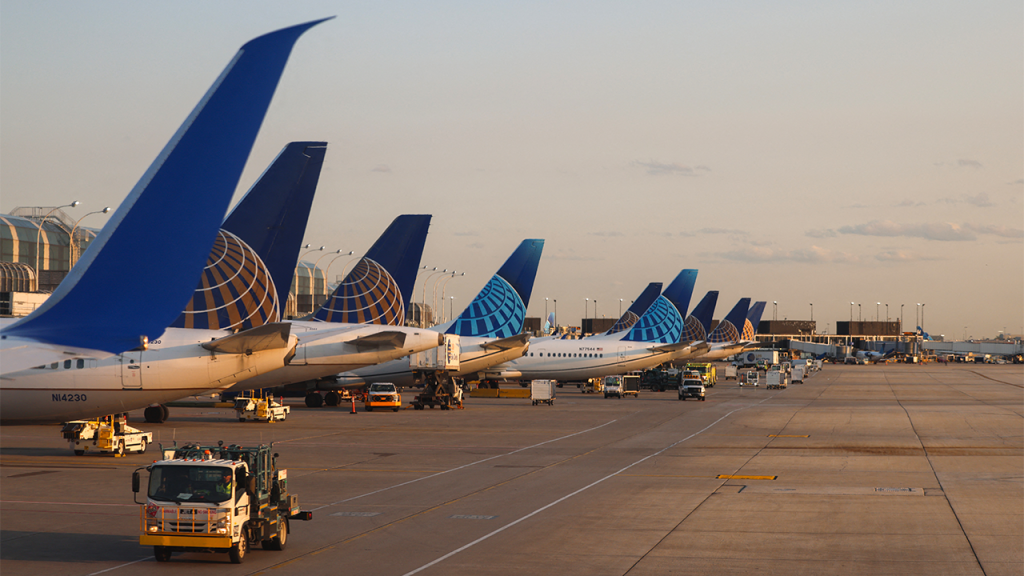A United Airlines flight was forced to abort takeoff at Chicago’s O’Hare International Airport after one of its engines caught fire. The incident occurred around 2 p.m. as the flight, headed to Seattle-Tacoma International Airport, was preparing for departure. The Federal Aviation Administration confirmed the engine fire, which led to a temporary halt in arrivals at the airport. An airport spokesman described the situation as an “emergency” but noted that it was resolved safely. The plane, an Airbus A320 carrying 148 passengers and five crew members, was towed back to the gate and passengers deplaned without any reported injuries.
In a statement to Fox News Digital, United Airlines assured that alternative travel arrangements were being made for affected passengers. The incident caused disruptions during the busy Memorial Day travel period, with the FAA temporarily halting arrivals into O’Hare International Airport. Meanwhile, at John F. Kennedy International Airport in New York, a ground stop was issued by the Air Traffic Control System Command Center. The cause of the engine fire and the extent of the damage to the aircraft remain unclear. Efforts to obtain comments from the Chicago Fire Department and Airbus, the aircraft manufacturer, were ongoing at the time of reporting. The story is still developing and updates are expected.
The engine fire on the United Airlines flight highlights the potential dangers associated with air travel and the importance of safety measures in responding to emergencies. Despite the frightening incident, passengers were successfully evacuated from the plane without any reported injuries. The prompt actions taken by the flight crew and airport personnel helped ensure that the situation was resolved quickly and effectively. The impact of the incident on the airline’s operations and the affected travelers underscores the need for contingency plans and alternative arrangements to accommodate disrupted flights.
The decision to halt arrivals at O’Hare International Airport following the engine fire reflects the prioritization of safety in air travel operations. The FAA’s response to the emergency situation demonstrates the regulatory oversight and coordination needed to manage incidents effectively. The grounding of flights at both O’Hare and JFK airports underscores the potential ripple effects that disruptions in one location can have on air travel across the country. As investigations into the cause of the engine fire continue, authorities and aviation experts will work to determine any underlying issues or contributing factors that need to be addressed to prevent similar incidents in the future.
United Airlines’ handling of the aftermath of the engine fire, including providing support to affected passengers and making alternative travel arrangements, reflects the importance of customer service and communication in crisis situations. The airline’s commitment to passenger safety and well-being, as evidenced by the successful evacuation and lack of injuries, is crucial in maintaining trust and confidence among travelers. The collaborative efforts of various stakeholders, from airline employees to emergency responders to regulatory agencies, in responding to the incident highlight the collective responsibility in ensuring the safety and security of air transportation. As the investigation progresses and more details emerge, lessons learned from this incident can inform future safety protocols and emergency preparedness measures within the aviation industry.
Overall, the engine fire on United Airlines Flight 2091 serves as a reminder of the unpredictability of air travel and the importance of readiness and response in handling emergencies. The incident, occurring during a busy holiday travel period, underscores the need for vigilance and preparedness to address potential risks and disruptions. The collaborative efforts of different agencies and organizations in managing the situation, as well as the swift actions taken to ensure passenger safety, highlight the dedication to safeguarding the integrity of air transportation. As the investigation continues and updates are provided, the incident will likely prompt discussions on safety measures, regulatory practices, and contingency planning to enhance the resilience of the aviation industry.


